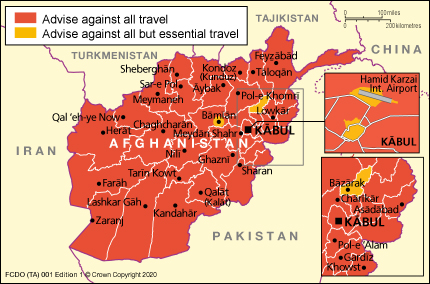
The Foreign, Commonwealth & Development Office (FCDO) advises against all but essential travel to:
the whole of Afghanistan based on the current assessment of COVID-19 risks
In addition and for security reasons, the FCDO advises against all but essential travel to:
- the Enhanced Security Zone in Kabul
- Hamid Karzai International Airport, Kabul
- Panjshir province
- the city of Bamian in Bamian province
The FCDO advises against all travel to:
- all other areas of Kabul and the rest of Afghanistan
Travel to Afghanistan is subject to entry restrictions
See Entry requirements for more information before you plan to travel.
Preparing for your return journey to the UK
If you’re returning to the UK from overseas, you will need to:
Check our advice on foreign travel during the coronavirus (COVID-19) pandemic and sign up for email alerts for this travel advice.
If you’re planning travel to Afghanistan, find out what you need to know about coronavirus there in the Coronavirus section.
During the COVID-19 pandemic, it is more important than ever to get travel insurance and check it provides sufficient cover. See the FCDO’s guidance on foreign travel insurance.
Consular support is not available in parts of Afghanistan where the FCDO advise against all travel and severely limited where the FCDO advise against all but essential travel. The level of consular assistance the British Embassy can provide to travellers in Afghanistan is extremely limited. There are limits to the assistance the FCDO can provide in a crisis, depending on the security and transport situation. You should not assume that the FCDO will be able to provide assistance to leave the country.
The British Embassy is not able to accept registrations from British nationals travelling in Afghanistan or monitor their safety when they are in country. Staff from the British Embassy may be unable to travel to certain parts of the country due to the security situation; this may severely limit the consular assistance that can be offered. Travel by road throughout the country, but particularly outside the capital Kabul, is extremely dangerous. Seek professional security advice for all travel and consider using armoured vehicles.
Hotels and guesthouses used by foreign nationals and the government of Afghanistan are subject to regular threats. The British Embassy doesn’t allow official visitors to stay in hotels overnight and has placed restaurants and other venues off limits to staff. Make sure your accommodation is secure and review your security measures regularly.
Terrorists are very likely to try to carry out attacks in Afghanistan. Specific methods of attack are evolving and increasing in sophistication. You should note an overall increased threat to Western interests in Kabul. Follow the instructions of local authorities. There is a high threat of kidnapping throughout the country. See Terrorism
Afghanistan is in a major earthquake zone and remains at risk from powerful earthquakes, aftershocks, landslides and flooding. The British Embassy can provide limited consular assistance in Afghanistan, particularly outside the capital Kabul. See Natural disasters
You can contact the emergency services by calling 119 (police and ambulance) and 112 (fire). They are unlikely to speak English.
If you’re abroad and you need emergency help from the UK government, contact the nearest British embassy, consulate or high commission.